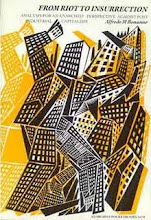Published in Deranged Issue 0
The function of space throughout the development of capital could be described as true ‘history’. From the first enclosures of great masses of people into circumscribed spaces to the most advanced factories today, capitalism has tried to cut out portions of space to dedicate them to one specific use: the production of surplus value. Now, with the advent of the recent post-industrial development and advances in technology, the management of this space has changed profoundly. It has passed from a partial management to a total one. Here capital has had the support of power and the State. We think that it is important to reflect on the conditions of the relationship that exists today between social space and capital.
No part of physical space is free from the interference of capital. From sidereal space to the ocean depths, from the mountains to the rivers, from the seas to the deserts, from the great metropoli to the most out-of-the-way villages. A series of relations between elements that seem far apart are linked by the common matrix as objects of exploitation that intersect and overlap. Thus, we can think we are going somewhere far away, out of this world, as they say, only to discover that even there, in that place, the mechanisms of capital reach it and function perfectly. That explains why we are against ecologism just as we are against any other ‘alternative’ proposal that claims to do something against exploitation by cutting out one part of reality. Of course, we must start off from a specific part in our interventions, but we know that we cannot really attack the enemy if we stay within that ‘part’. To move on to attack we must go beyond fragmentation (single issues), a strategy that has been imposed upon us by capital.
Now, of all the misappropriation that has come about through exploitation, the most serious, because it has the worst consequences, is that of time and of space. In substance the two are linked. Capital steals our time by obliging us to work, and conditions our life, infesting it with clocks, obligations and deadlines, right down to the smallest detail. By stealing our time they prevent us from understanding ourselves, they estrange us from ourselves. They alienate us. Without time we hardly even notice the theft of space any more. We need time in order to even notice the existence of space. To think, to listen, to dream, to desire. By living space in terms of distance, as kilometres to be covered, and constantly moving from one place to another, we lose sight of our relationship with things, nature and the world.
Capital has stolen our time from us (it needed it for production) and it has stolen our space (it needed it first as place of production, then as system of control and repression, then to obtain general consensus). Now we are faced with the need to expropriate our time and space. This expropriation cannot be other than violent and traumatic. For both ourselves and our enemies. Our attack cannot fail to cause damage and ruin. It is in the logic of things, the logic of the class war. The project of power is global. It cannot allow ‘empty spaces’ to exist. For the opposite reason, our project of liberation is also global. If we allow capital to globalize power we will end up dead.
Fortunately power still has a long way to go. We are just at the beginning of a design based on the division of reality into two parts that are physically separate. Following the global misappropriation of space and time, capital is now separating the latter into two parts. It is no longer a question of the old fragmentation, but of a net division, a real WALL between the included and the excluded. The first will be guaranteed a situation of privilege, power, high level culture, projectuality and creativity; the second, a situation of survival, consensus, sub-culture, supine acceptation, lack of stimuli and perhaps even needs. In this perspective capital and the State need the whole of social space at their disposition. Nothing must escape their control.
Not only. Capital now disposes of technologies that permit not just the simple physical possession of space, but also its production. Think of the capacity to operate in ‘real time’ communication between two points, thousands of kilometres away from each other. That does not only change production (quality, variety, creativity, storage, etc), but also and principally the whole arrangement of social relations (which are also economic).
So, capital produces space on the basis of its project of exploitation and power. It transforms and destroys nature, modifies towns and countryside, destroys seas, rivers, lakes, adapts stellar distances to its militaristic logic. Then, the spaces thus produced serve to channel individuals. That is how we end up in long lines of cars on motorways or in queues in supermarkets. Thatis how we find ourselves afflicted with chaotic trajectories, appointments we can’t miss, fictitious interests that make us suffer and force us to make continual senseless deplacements. We move within spaces that have been programmed for us, that we only have the illusion of having ‘chosen’. Our houses are full of useless, harmful objects. Space has become so restricted, or rather, it has changed according to the needs of capitalist production, which must sell televisions, fridges, washing machines, bedroom furniture and kitchens.
So, almost without realizing it, our time is disappearing into nothing and our space is reducing itself to relating to objects that testify to capital’s powers of persuasion. In this way we are educated to repetitiousness. We make the same gestures, touch the same objects, push the same buttons. Repetition is, as everybody knows (but systematically forgets) the antichamber of consensus.
For its part, capital must take away our space. It is practically obliged to. And that is because it cannot leave room to our creativity, our capacity to do-it-yourself, our desire for the new (which is above all the stimulus to find solutions that reveal undreamed of gifts of spontaneity and wealth). If capital were to leave space to the forces of the individual it would not be able to maintain the pace of repetition that is indispensable to production, which, we must not forget, is only such on condition that it can also be re-produced. Think of the efforts (aided by electronic techniques) that capital is making to realize everybody’s desires with the maximum diversification possible (but all centralized and codified). The great labels of fashion items, the fast-food chains, the advertising that exalts the taste of the individual within mass production, are no more than attempts to prevent other roads that could still be tried today.
Space is therefore produced and reproduced on the basis of consensus, but also possesses considerable purely repressive aspects in the policing sense of the term. Control regulates various fluxes in the narrowest possible way. Raw materials and people, ideas and machines, money and desires. Everything is coordinated because everything has been preventively homogenized; differences have become simply that, they are no longer radical diversity. They have been reduced to the level of appearance and, in this new guise, elevated to the maximum degree, as the kingdom of freedom.
The strategy of power is therefore that of controlling ‘all’ space in the same way as it controls ‘all’ time. It is not just a question of police control but mainly control based on consensus and the acceptance of models of behaviour and scales of values that belong to the technocrats of capital.
What to do: Go in search of lost time? Of lost space?
Certainly not in the sense of a nostalgic trajectory in a backward direction. In life nothing can turn back just as nothing ever presents itself the same way a second time around (nor in one that is absolutely different).
The old relationship with space left a trace. A sign of a physical place. The sign of people and their things. A road, a town square, a country lane, a river, the sea and the sky, the woods and the mountains, had an ongoing discourse with the individual who knew how to (and wanted to) listen to them. And affinity with other individuals took people to the same places, animated feelings, pushed to them to reflect and to act. Individuals existed, whereas now one hides like a part of a whole, of a crowd. Once we were exposed, often unprepared and vulnerable. Now we go under cover of uniformity and repetitivity. We feel more secure because we belong to the flock. There are no points of reference in space or time. Everything is about to be wiped out. Sounds, smells, thoughts and dreams. Everything is being produced and reproduced. Everything is about to be reduced to merchandise.
In this perspective the struggle for social spaces becomes a struggle for the reappropriation of the whole ‘territory’ beyond and against the rules of control and consensus.
OCCUPATION AND DEFENCE OF
SELF-MANAGED SPACES
By self-managed social space we mean an urban space taken by a number of individuals with the aim of using it directly, for their own aims, beyond the logic of capitalist power and exploitation.
Compared to social spaces (schools, barracks, factories, etc.) where a specific function is imposed, aimed at guaranteeing the interests of capital, the struggle for the conquest of a self-managed social space constitutes an important and continuous attempt to practice freedom of action and expression that would be denied elsewhere.
Right from the start, therefore, this struggle is constituted of a number of anti-authoritarian actions that begin from a critical analysis of class society and its main functions. These are therefore struggles that adopt the method of self-management, they try to realise freedom and social and individual equality, so are indispensable for proceeding along the road of the abolition of power and capitalist exploitation.
The self-managed method is the only one that prevents an instrumentalisation of the struggle by political parties, unions, council representatives, etc. But for that to happen, it is necessary for the method to be employed correctly, guaranteeing freedom of decision in everything that is done during the course of the struggle.
This self-management can be distinguished in two phases:
a) self-management of the struggle for the conquest of social space through squatting; b) self-management of the struggle for the defence of social space through an opening towards the outside.
As far as the first phase is concerned it should be said that the occupation can only be realised if it has managed to constitute a mass structure based on a precise affinity between the individuals that belong to it. This is not so much an ideological affinity as a substantial one. The existence of common desires and common problems make it possible, at a given moment, for a group of people to get together to struggle against common exploitation. This is something that we need to be very clear about. The class dominion of capital is the cause of the present lack of self-managed social space and the presence of fictitious social spaces, precisely because the economic and social exploitation that serves the interests of power and capital is realised within the latter. The struggle for the ‘real’ conquest of social spaces therefore necessarily passes through the violent rupture with the dominant logic of capital. The latter cannot and will not remain passive before our concrete initiatives of liberation of social spaces, because these initiatives constitute a considerable danger for it.
The State and capital put precise limits on us which, when they are overcome, immediately put us in the condition of being ‘outlaws’. To squat means to go beyond these limits, it means to become an ‘outlaw’. That is why it is necessary make a violent break with the rules that have been imposed on us. That is why it is necessary to squat.
Coming to the second phase, it is more than obvious that we must know how to take our freedom ourselves, through our struggles. It is not written in any constitution that someone will give it to us. This includes social space: no one wants to give it to us. Whoever has it manages it according to their own interests (which are sometimes not to use them at all and simply leave them empty). When these spaces are given to us, it is because they want to control us and ghettoize us instead of putting the classic cop on our tail, which costs money, so that they know where we are and what kind of things we are talking about. That is why, sometimes, they are quite happy to give us spaces, especially after we begin actions of intervention in social reality. It is obvious that we don’t need spaces of this kind, which cannot be called self-managed, because self-management is not just a question of managing the inside of the place.
We must therefore take our spaces ourselves, i.e. squat them. But it is not just a question of taking them, we must also defend them.
This defence must not only be a question of barricading ourselves behind a wall and putting barbed wire outside. We cannot limit ourselves to simply keeping the cops out. To defend conquered social space it is necessary to grow, qualitatively and quantitively, with outside intervention and the capacity to develop a discourse that has some meaning and doesn’t simply reduce itself to the satisfaction of one’s own interests or the exercise of one’s own personal capacities. Music, poetry etc., are all very interesting but, if they remain closed within the space, even squatted, they would just become another characteristic of the ghetto.
The best way to defend the conquered space is therefore the opening towards the outside.
To conclude we can say: the conquest of space only comes about with violent occupation, in that any other road (negotiation) is not valid. After, the self-management of space comes about with defence that doesn’t only consist of the minimal aspects that we could define ‘militaristic’, but also, and mainly, in opening up to the outside, talking to people, meeting and linking one’s own situation to the situation of the area one happens to be in.
skip to main |
skip to sidebar

Some writings of Alfredo Maria Bonanno in English, or almost

Alfredo Bonanno was arrested on October 1st 2009 in Greece, accused of concourse in robbery. With him, anarchist comrade Christos Stratigopoulos.
Here are a few translations and part translations of a small portion of Alfredo's writing. This is a work in progress, many of the translations are as yet incomplete. Open links to find more of Alfredo's work.
Alfredo Bonnano Released
Nov. 22 Alfredo Bonnano was sentenced to 4 years imprisonment (which practically means that with the time served so far and the fact that he is over 70years old HE IS RELEASED
Christos Stratigopoulos (who took responsibility for the action)
was sentenced to 8 years and 9 months with the Greek law will probably be released at the end 2011
BY ANY MEANS NECESSARY
LINKS
click on any of these labels to read text
- "Community" sickness
- 1981 - Editorial
- A Critique of Syndicalist Methods
- A few notes on Sacco and Vanzetti
- A few notes on the revolutionary movement in Italy
- A little man in Singapore
- A million jobs
- A question of class
- Affinity
- After Marx autonomy
- Albania Laboratory of Subversion (Introduction)
- Anarchism and the national liberation struggle
- Anarchists and action
- AND WE WILL ALWAYS BE READY TO STORM THE HEAVENS AGAIN (Against amnesty)
- ANTI-INSTITUTIONAL MOVEMENT
- Are we modern?
- Armed Joy
- ARMED STRUGGLE. SOME REFLECTIONS.
- Autonomous base nuclei
- beyond syndicalism
- Beyond workerism
- But what is the imaginary?
- Class War
- Comiso - Organizational document of the self-managed leagues
- Considerations on illegality
- Dissonances (Introduction)
- Elephant Editions 1986
- Excluded and included
- Farewell to claiming
- Feral Revolution (Introduction)
- FICTITIOUS MOVEMENT AND REAL MOVEMENT
- For an Antiauthoritarian Insurrectionist International - Proposal for a debate
- From riot to insurrection
- From the centre to the periphery
- Good technology
- Guerilla Extraordinary
- Habits and idols
- Hegel
- I know who killed chief superintendent Luigi Calabresi
- Illegality
- Illness and capital
- Informal organisation
- Insurrection
- Internationalism
- Introduction to Sabate
- Introduction to Anarchism and Violence
- Introduction to Bratach Dubh English edition of Malatesta's Fra Contadini
- Introduction to Insurrectionalist Anarchism
- Introduction to Strange Victories
- Introduction to The Conquest of Bread
- Involuntary aspects of voluntary work
- Let's destroy work
- LET'S DESTROY WORK. New introduction
- Let's keep our feet on the ground please
- Lightening Conductors and Stand-ins - more shots of non-news
- Lightning Conductors and Stand-ins
- Lightning Conductors and Stand-ins (cont.)
- Locked up
- Looking forward to self-management
- Loss of language
- More on internationalism
- National Liberation Struggle
- nineteen years on
- No more crises
- Non-news about drugs
- Non-news about racism
- Ode to the Uniform
- On Feminism
- One's life on the line
- Order and chaos
- Otto Ruhle (Introductory Note)
- OUR ROLE IN THE PRESENT CONFLICT
- Palestine mon amour
- Pantagruel anarchist review
- Pinelli
- Prison and Prisoners’ Struggles - Introduction
- Propulsive Utopia
- Quality and the factory
- Restructuring Capital and the new democracy
- Revolution - Violence - Antiauthoritarianism
- REVOLUTIONARY VIOLENCE
- Science and the social revolution
- Self-management
- Severino Di Giovanni in Argentina 1923-1931 by Osvaldo Bayer
- Social banditry
- SOME NOTES -
- Space and Capital
- Stirner
- Stop the City? From information to attack
- Strategy and Methods
- Streamlined production
- The "end" of the crisis
- The aesthetics of anarchism
- The anarchist tension
- The area of autonomy and the anarchist movement in Italy
- The armed wing of science
- The Cruise missile base at Comiso can be prevented
- The ethical bank
- The insurrectional project
- THE LANGUAGE OF TECNICS -
- The logic of insurrection
- The moral split
- THE NECESSARY DESTRUCTION -
- The priority of practice
- The refusal of arms
- The revolutionary project
- The revolutionary struggle
- The significance of an insignificant event
- The struggle for self-managed social space
- The tyranny of weakness
- The whole and the part
- The young in a post industrial society
- Theory and action
- Towards anarchist antimilitarism
- TOWARDS THE GENERALISATION OF ARMED STRUGGLE
- TRANSFORMATION IN THE WORLD OF WORK AND SCHOOL -
- TRUTH -
- Unemployment in Italy - How come everything doesn't explode?
- Untitled
- Violence and non-violence
- What are anarchists
- What can we do with anti-fascism?
- Why a vanguard?
- Why Insurrection
- World domination in a few words









